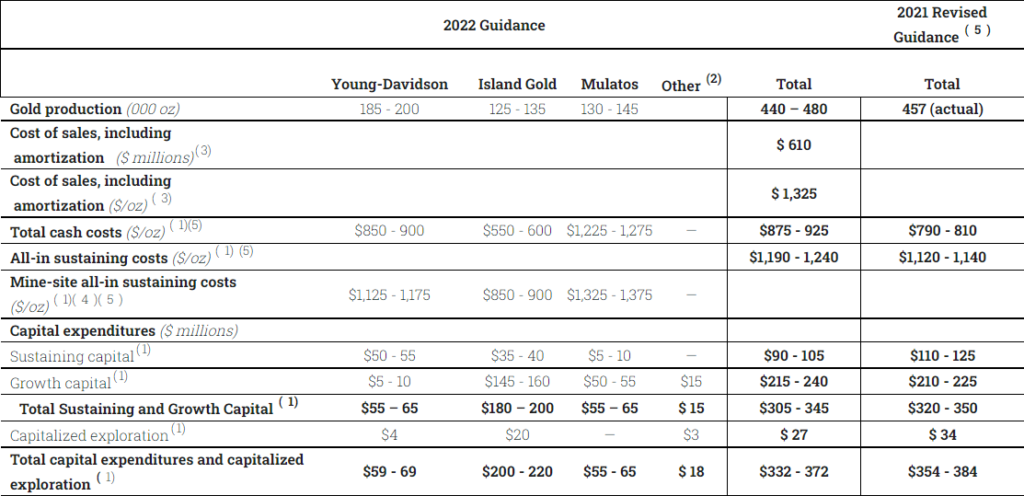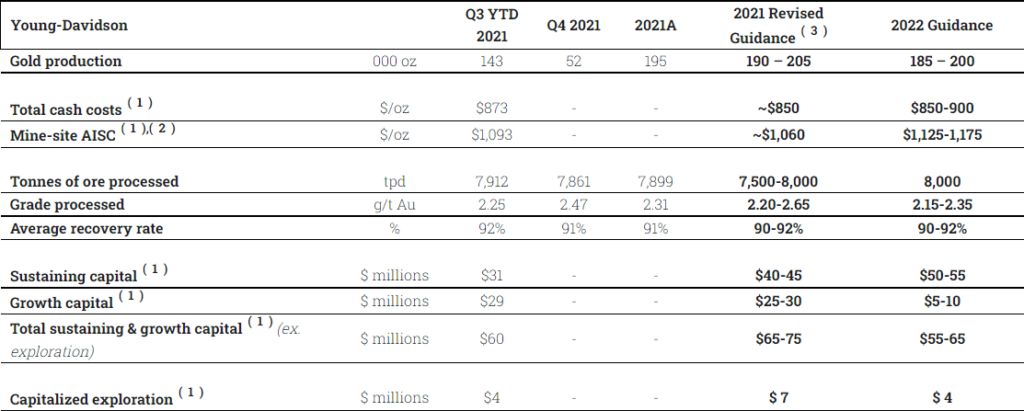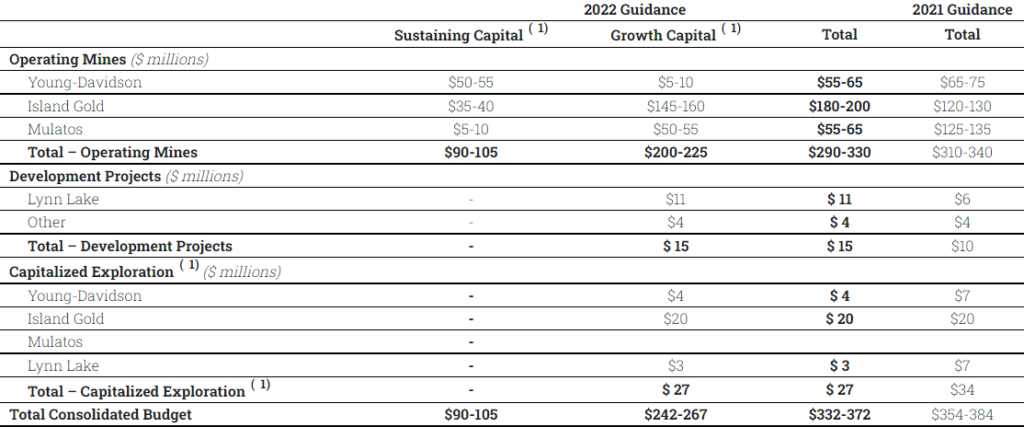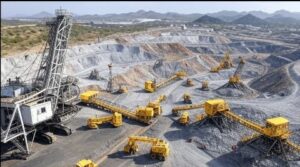High-return organic growth to drive production higher at significantly lower costs over the next three years
TORONTO, Jan. 17, 2022 (GLOBE NEWSWIRE) — Alamos Gold Inc. (TSX:AGI; NYSE:AGI) (“Alamos” or the “Company”) today reported fourth quarter and annual 2021 production. The Company also provided three-year production and operating guidance.
“With stronger production in the fourth quarter, we met our revised full year 2021 guidance. This was driven by strong performances through the year from both Young-Davidson and Island Gold, with the former achieving record mining rates and free cash flow. This offset a challenging year at Mulatos as we work through a transitional phase with higher costs until La Yaqui Grande comes online in the second half of 2022. This temporary increase in costs at Mulatos and industry-wide inflation are the key drivers of higher consolidated costs in 2022, though we expect a significant improvement in costs in 2023 and beyond,” said John A. McCluskey, President and Chief Executive Officer.
“We are pleased to be providing our inaugural three-year guidance which outlines our strong outlook. Our key high-return growth projects remain on track and are expected to support higher production at substantially lower costs in the years ahead. The completion of La Yaqui Grande will be the key near-term driver of lower costs, and Island Gold will be the primary driver of significantly lower costs over the longer term with the Phase III expansion. These high-return reinvestments are fully funded and form a key part of our sustainable business model that can support growing returns to our stakeholders over the long term,” Mr. McCluskey added.
Fourth Quarter and Full Year 2021 Operating Highlights
- Met 2021 annual production guidance: production of 457,200 ounces of gold in 2021 was in line with revised production guidance and represented a 7% increase from 2020. This included fourth quarter production of 112,500 ounces, an increase from the third quarter, with strong performances at Island Gold and Young-Davidson offsetting lower production from Mulatos
- Costs expected to meet 2021 guidance: total cash costs and all-in sustaining costs for 2021 have not been finalized but are expected to be consistent with revised full year guidance of $790 to $810 per ounce and $1,120 to $1,140 per ounce, respectively
- Record revenues: sold 112,966 ounces of gold in the fourth quarter at an average realized price of $1,797 per ounce for revenues of $203 million. Full year sales totaled 457,517 ounces of gold at an average realized price of $1,800 per ounce for record revenues of $824 million
Three Year Guidance Overview 1 – Operating Mines
- Stable production in 2022 with 4% growth expected in 2023: production is expected to be between 440,000 and 480,000 ounces in 2022, consistent with 2021, and increase approximately 4% (based on the mid-point of guidance) to between 460,000 and 500,000 ounces in 2023 and 2024. The completion of the Phase III expansion at Island Gold is expected to drive a further increase in production in 2025 with additional growth potential from Lynn Lake
- Total cash cost guidance of $875 to $925 per ounce in 2022, improving substantially to $650 to $750 per ounce in 2024: costs are expected to increase in 2022, reflecting industry-wide cost inflation and temporarily higher costs at Mulatos. Costs at Mulatos and on a consolidated basis are expected to decrease starting in the second half of 2022 with the commencement of low-cost production from La Yaqui Grande. Island Gold is expected to contribute to lower costs in 2024, along with a further reduction in costs following the expected completion of the Phase III expansion in 2025
- All-in sustaining cost (“AISC”) guidance of $1,190 to $1,240 per ounce in 2022, improving to $950 to $1,050 per ounce in 2024: consistent with total cash costs, AISC are expected to decrease approximately 18% from 2022 to 2024 (based on the mid-point of guidance), reflecting lower costs at Mulatos and Island Gold. AISC are expected to decrease further in 2025 with the completion of the Phase III expansion at Island Gold
- Total capital guidance, excluding capitalized exploration, of $305 to $345 million in 2022: this includes $290 to $330 million of capital at producing mines and is down slightly from 2021 guidance with lower capital at La Yaqui Grande and Young-Davidson more than offsetting the ramp up in spending on the Phase III expansion at Island Gold. Capital spending for producing mines is expected to decrease approximately 23% in 2023 to between $220 and $260 million, reflecting the completion of construction of La Yaqui Grande, and remain at similar levels in 2024. Total capital is expected to decline further following the completion of the Phase III expansion at Island Gold in 2025. The total capital budget for 2022 includes:
- Sustaining capital guidance of $90 to $105 million: down approximately 17% from 2021, reflecting lower sustaining capital at Mulatos. Sustaining capital is expected to remain at similar levels through 2024
- Growth capital guidance for producing mines of $200 to $225 million: consistent with 2021 with the majority related to the Phase III expansion at Island Gold and completing construction at La Yaqui Grande
- Exploration budget of $40 million: with more than half allocated to following up on ongoing exploration success at Island Gold
- Fully funded growth: the Phase III expansion at Island Gold and La Yaqui Grande are expected to be funded through ongoing cash flow and existing cash. The Company expects to generate positive free cash flow in the second half of the year as costs and capital spending decrease with the start of production at La Yaqui Grande
- Strong ongoing returns to shareholders: including the existing $0.10 per share annualized dividend (paid quarterly) and planned share repurchases under the Normal Course Issuer Bid. In 2021, the Company returned approximately $51 million to shareholders between dividends and share repurchases, representing a combined yield of approximately 1.8% at current share prices
1 Guidance statements in this release are forward-looking information. See the Assumptions and Sensitives section of this release along with the cautionary note at the end of this release.
Upcoming 2022 catalysts
- 2021 year-end Mineral Reserve and Resource update: February 2022
- La Yaqui Grande commercial production: Q3 2022
- Island Gold Phase III expansion updated mine plan: mid-2022. This will incorporate the significant growth in high-grade Mineral Reserves and Resources since the completion of the July 2020 study into an optimized mine plan which is expected to enhance already attractive economics and the value of the operation
- Lynn Lake completion of permitting and construction decision: H2 2022
Fourth Quarter and Full Year 2021 Operating Results

(1) 2021 production guidance for Mulatos was revised lower on October 27, 2021. Production guidance for Young-Davidson and Island Gold was unchanged from initial 2021 guidance.
(2) 2020 total production included 800 ounces from El Chanate.
2022 Guidance

(1) Refer to the “Non-GAAP Measures and Additional GAAP” disclosure at the end of this press release for a description of these measures.
(2) Includes growth capital and capitalized exploration at the Company’s development projects (Lynn Lake and Esperanza).
(3) Cost of sales includes mining and processing costs, royalties, and amortization expense, and is calculated based on the mid-point of total cash cost guidance.
(4) For the purposes of calculating mine-site all-in sustaining costs at individual mine sites, the Company does not include an allocation of corporate and administrative and share based compensation expenses to the mine sites.
(5) 2021 production and cost guidance revised on October 27, 2021.
Gold production in 2022 is expected to remain at similar levels as 2021 and weighted towards the second half of the year (55% of total production) given the anticipated start of production at La Yaqui Grande mid-year. Total cash costs and AISC are expected to decrease through the year and be significantly lower in the second half of 2022, reflecting the start of low-cost production from La Yaqui Grande.
Full year AISC are expected to increase approximately $85 per ounce, or 8% from 2021 (based on the mid-point of guidance). The primary driver of the increase is approximately 5% cost inflation, which is being experienced industry-wide, and a temporary increase in costs at Mulatos as the operation transitions from mining of higher-cost Mulatos and stockpiled ore, to the higher grade and lower cost La Yaqui Grande mine. This temporary increase in costs at Mulatos is partially offset by lower sustaining capital at the operation with the stripping of the El Salto portion of the main Mulatos pit largely completed in 2021.
Cost guidance continues to include COVID-19 testing and other related health and safety costs across all three operating mines. Full year production and cost guidance assumes no significant operational interruptions due to COVID-19.
Capital spending is expected to be higher during the first half of the 2022 and trend lower during the second half of the year following the completion of construction of La Yaqui Grande. Approximately 60% of the 2022 capital budget is expected to be spent during the first half of the year.
2022 – 2024 Guidance: Operating Mines
| 2022 | 2023 | 2024 | ||
| Gold Production | ||||
| Young-Davidson | 000 oz | 185 – 200 | 185 – 200 | 185 – 200 |
| Island Gold | 000 oz | 125 – 135 | 115 – 125 | 140 – 155 |
| Mulatos | 000 oz | 130 – 145 | 160 – 175 | 135 – 145 |
| Total gold production | 000 oz | 440 – 480 | 460 – 500 | 460 – 500 |
| Total cash costs ( 1) | $/oz | $875 – 925 | $775 – 875 | $650 – 750 |
| All-in Sustaining costs ( 1) ,(2) | $/oz | $1,190 – 1,240 | $1,075 – 1,175 | $950 – 1,050 |
| Sustaining capital ( 1 ),( 3 ) | $ millions | $90 – 105 | $95 – 110 | $95 – 110 |
| Growth capital ( 1 ), ( 3 ) | $ millions | $200 – 225 | $125 – 150 | $135 – 160 |
| Total sustaining & growth capital ( 1 ),( 3 ) (Operating mines; ex. Exploration) | $ millions | $290 – 330 | $220 – 260 | $230 – 270 |
(1) Refer to the “Non-GAAP Measures and Additional GAAP” disclosure at the end of this press release for a description of these measures.
(2) All-in sustaining cost guidance for 2023 and 2024 includes the same assumptions for G&A and stock based compensation as included in 2022.
(3) Sustaining and growth capital guidance is for producing mines and excludes capital for Lynn Lake and other development projects, and capitalized exploration.
(4) 2023 and 2024 Cost of sales guidance has not been provided given amortization charges are based on reserves and resources at the end of each of these years and cannot be reasonably estimated at this time.
Gold production is expected to increase approximately 4% in 2023, driven by higher production from the Mulatos District given a full year of production from La Yaqui Grande, as well as ongoing production from the main Mulatos operation. Company-wide gold production is expected to remain at similar levels in 2024 with higher production from Island Gold offsetting lower production from Mulatos.
Total cash costs and AISC are expected to decrease 8% and 7%, respectively, in 2023, reflecting significantly lower costs at Mulatos with La Yaqui Grande ramped up and operating for the full year. A more significant improvement in costs is expected in 2024 with a further decrease in costs at Mulatos, with La Yaqui Grande providing the majority of production, and lower costs at Island Gold, reflecting the mining and processing of higher grades. Total cash cost and AISC are expected to decrease 22% and 18%, respectively, between 2022 and 2024. Both are expected to decrease further following the completion of the Phase III expansion at Island Gold in 2025.
A chart accompanying this announcement is available at https://www.globenewswire.com/NewsRoom/AttachmentNg/c1757217-445c-4cde-847c-8aecafe86687
Capital spending at existing operations (excluding Lynn Lake and other development projects) is expected to decrease 23% in 2023, primarily driven by lower capital at Mulatos following the completion of construction at La Yaqui Grande in 2022. Capital spending at existing operations is expected to remain at similar levels in 2024 and decrease substantially following the completion of the Phase III expansion at Island Gold in 2025. Sustaining capital spending at existing operations is expected to remain relatively stable over the next several years at approximately $90 to $110 million per year.
A chart accompanying this announcement is available at https://www.globenewswire.com/NewsRoom/AttachmentNg/81e26392-a0b5-4f2c-bc6c-453074c60155
Young-Davidson

(1) Refer to the “Non-GAAP Measures and Additional GAAP” disclosure at the end of this press release and the Q3 2021 MD&A for a description and calculation of these measures.
(2) For the purposes of calculating mine-site all-in sustaining costs at individual mine sites, the Company does not include an allocation of corporate and administrative and share based compensation expenses to the mine sites.
(3) 2021 cost guidance was revised on October 27, 2021. Production guidance was unchanged
Gold production at Young-Davidson in 2022 is expected to be consistent with 2021, reflecting similar grades and mining and processing rates. Following the completion of the lower mine expansion in July 2020, underground mining rates increased to average a record 7,889 tpd in 2021, including a record 8,128 tpd in the second half of 2021. Mining and processing rates are expected to average design rates of 8,000 tpd going forward.
Grades mined and processed are expected to range between 2.15 and 2.35 grams per tonne of gold (“g/t Au”) in 2022 and remain at similar levels through 2024. Grades mined are expected to increase thereafter, as YD West becomes more of a significant contributor to production.
Total cash costs and mine-site AISC are expected to increase from 2021, primarily reflecting industry-wide cost inflation, partially offset by operational improvements. Costs are expected to remain at similar levels over the next three years.
Capital spending in 2022 (excluding exploration) is expected to range between $55 and $65 million, a decrease from 2021 with construction of the new life of mine tailings facility (“TIA 1”) completed in the fourth quarter of 2021. Capital spending is expected to remain at similar levels in 2023 and decrease slightly in 2024.
Young-Davidson is expected to generate record mine-site free cash flow of approximately $100 million in 2021, driven by higher production, lower costs and lower capital with the completion of the lower mine expansion. At a $1,750 per ounce gold price, the operation is expected to generate similar mine-site free cash flow in 2022 and over the long term.
Island Gold
| Island Gold | Q3 YTD 2021 | Q4 2021 | 2021A | 2021 Revised Guidance ( 3 ) | 2022 Guidance | |
| Gold production | 000 oz | 103 | 38 | 141 | 130 – 145 | 125 – 135 |
| Total cash costs ( 1 ) | $/oz | $512 | – | – | ~$525 | $550-600 |
| Mine-site AISC ( 1 ),( 2 ) | $/oz | $860 | – | – | ~$865 | $850-900 |
| Tonnes of ore processed | tpd | 1,174 | 1,247 | 1,193 | 1,200 | 1,200 |
| Grade processed | g/t Au | 10.29 | 10.51 | 10.35 | 9.0-11.0 | 8.8-10.8 |
| Average recovery rate | % | 96% | 96% | 96% | 96-97% | 96-97% |
| Sustaining capital ( 1 ) | $ millions | $36 | – | – | $40-45 | $35-40 |
| Growth capital ( 1 ) & capital advances | $ millions | $43 | – | – | $80-85 | $145-160 |
| Total sustaining & growth capital ( 1 ) (ex. exploration) | $ millions | $79 | – | – | $120-130 | $180-200 |
| Capitalized exploration ( 1 ) | $ millions | $14 | – | – | $ 20 | $ 20 |
(1) Refer to the “Non-GAAP Measures and Additional GAAP” disclosure at the end of this press release and the Q3 2021 MD&A for a description and calculation of these measures.
(2) For the purposes of calculating mine-site all-in sustaining costs at individual mine sites, the Company does not include an allocation of corporate and administrative and share based compensation expenses to the mine sites.
(3) 2021 cost guidance was revised on October 27, 2021. Production guidance was unchanged
Gold production at Island Gold is expected to decrease slightly in 2022, reflecting lower planned grades which is consistent with the Mineral Reserve grade and the Phase III expansion study released in 2020 (“Phase III Study”). Mining and processing rates are expected to be consistent with 2021 and average 1,200 tpd. As outlined in the Phase III Study, grades mined are expected to decrease below the average Mineral Reserve grade in 2023 followed by an increase above the average Mineral Reserve grade in 2024 driving production higher.
Total cash costs and mine-site AISC are expected to increase in 2022, reflecting slightly lower grades and industry-wide cost inflation. Costs are also higher than outlined in the Phase III Study, reflecting inflation and the stronger Canadian dollar. The study assumed a USD/CAD foreign exchange rate of $0.75:1 compared to a rate of $0.80:1 assumed in the 2022 budget. Costs are expected to increase slightly in 2023, followed by a decrease in 2024, reflecting higher grades. A more substantial decrease is expected following the completion of the Phase III expansion in 2025.
Capital spending at Island Gold (excluding exploration) is expected to be between $180 and $200 million in 2022. As outlined in the study, construction activities and capital spending on the Phase III expansion are expected to increase in 2022. Permitting for the expansion is expected to be completed during the first half of the year. Shaft site surface works, construction of the hoisting plant and preparation of the shaft sink will be a major focus with the pre-sink of the shaft expected to start mid-2022. Consistent with the study, capital spending is expected to decrease slightly in 2023 and 2024 before decreasing closer to sustaining levels following the completion of the expansion in 2025.
Mulatos District
| Mulatos | Q3 YTD 2021 | Q4 2021 | 2021A | 2021 Revised Guidance ( 3 ) | 2022 Guidance | H1 2022 | H2 2022 | |
| Gold production | 000 oz | 98 | 23 | 121 | 135 – 145 | 130 – 145 | 45 – 50 | 85 – 95 |
| Total cash costs ( 1 ) | $/oz | $913 | – | – | ~$1,000 | $1,225-1,275 | ~$1,500 | ~$1,125 |
| Mine-site AISC ( 1 ),( 2 ) | $/oz | $1,097 | – | – | ~$1,235 | $1,325-1,375 | ~$1,675 | ~$1,175 |
| Tonnes of ore stacked – Mulatos crusher | tpd | 19,500 | 19,100 | 19,400 | 21,000 | 17,000 | ||
| Tonnes of ore stacked – La Yaqui Grande | tpd | – | 10,000 | |||||
| Grades stacked | g/t Au | 1.04 | 0.85 | 0.99 | 0.8-1.2 | 0.7-1.0 | ||
| Combined recovery ratio | % | 55% | 48% | 54% | 60 % | 65-70% | ||
| Sustaining capital ( 1 ) | $ millions | $15 | – | – | $30-35 | $5-10 | ||
| Growth capital ( 1 ) & capital advances | $ millions | $79 | – | – | $95-100 | $50-55 | ||
| Total sustaining & growth capital ( 1 ) (ex. exploration) | $ millions | $93 | – | – | $125-135 | $55-65 | ||
| Capitalized exploration ( 1 ) | $ millions | $1 | – | – | – | – |
(1) Refer to the “Non-GAAP Measures and Additional GAAP” disclosure at the end of this press release and the Q3 2021 MD&A for a description and calculation of these measures.
(2) For the purposes of calculating mine-site all-in sustaining costs at individual mine sites, the Company does not include an allocation of corporate and administrative and share based compensation expenses to the mine sites.
(3) 2021 guidance was revised on October 27, 2021.
Combined gold production from the Mulatos District (including La Yaqui Grande) is expected to be between 130,000 and 145,000 ounces in 2022. This represents a 13% increase from 2021 (based on the mid-point of guidance) as the second half of 2021 was impacted by longer than anticipated recovery times from stockpiled ore stacked in the latter part of the year. With the Cerro Pelon deposit depleted during the fourth quarter of 2021, stockpiled ore will be a more significant contributor to gold production during the first half of 2022.
Given the longer leach cycle and additional reagents required to process this ore, as well as lower grades from the El Salto portion of the Mulatos pit early in the year, gold production is expected to be lower during the first half of 2022 at significantly higher costs. With the start of production from La Yaqui Grande in the third quarter and increasing grades from El Salto, approximately 65% of 2022 production is expected in the second half of the year at substantially lower costs.
Grades stacked are expected to range between 0.7 and 1.0 g/t Au and trend higher through the year, reflecting the contribution of higher grade La Yaqui Grande ore in the second half of the year.
Total cash costs and mine-site AISC are expected to be well above annual guidance during the first half of 2022 and trend significantly lower during the second half of the year, driven by low-cost production growth from La Yaqui Grande.
Gold production is expected to increase to a range of 160,000 to 175,000 ounces in 2023 with costs decreasing significantly from 2022, driven by a full year of production from La Yaqui Grande. La Yaqui Grande is expected to be the primary source of production in 2024 with combined production in the range of 135,000 to 145,000 ounces and resulting in a further improvement in costs.
Capital spending is expected to total $55 to $65 million in 2022 with the majority being growth capital to complete construction of La Yaqui Grande. Development of La Yaqui Grande remains on track to achieve commercial production in the third quarter of 2022. Capital spending is expected to decrease closer to sustaining capital levels in 2023 and 2024.
2022 Global Operating and Development Capital Budget

(1) Refer to the “Non-GAAP Measures and Additional GAAP” disclosure at the end of this press release for a description and calculation of these measures.
2022 Capital Budget for Development Projects
Capital spending on the Company’s development projects, excluding exploration, is expected to total $15 million. This includes $11 million for Lynn Lake focused on advanced stage engineering and completing the permitting process. The majority of the remainder is focused on community engagement and permitting activities at Esperanza. An additional $27 million has been budgeted for capitalized exploration including $20 million for Island Gold and the remainder split between Young-Davidson, Mulatos and Lynn Lake.
Lynn Lake Development Budget
The total capital budget for Lynn Lake in 2022 is $14 million, including $11 million for development activities and $3 million for exploration. Development activities will be focused on environmental work in support of permitting, detailed engineering and other site access upgrades. The approval of the Environmental Impact Statement (“EIS”) for the project is expected in the second half of 2022 following which the Company expects to make a construction decision. Assuming a positive construction decision, development of Lynn Lake is expected to take approximately two years.
Other Projects
Total capital of $4 million has been budgeted across the Company’s other development projects with the majority at Esperanza. Additionally, holding costs for the Turkish assets and legal fees associated with the investment treaty claim, are expected to total approximately $3 million which will be expensed as incurred.
2022 Exploration Budget
The global exploration budget for 2022 is $40 million. Island Gold continues to account for the largest portion of the budget at $22 million, followed by $7 million at Mulatos, $5 million at Young-Davidson and $3 million at Lynn Lake. Approximately 70% of the 2022 budget will be capitalized.
Island Gold
A total of $22 million has been budgeted for surface and underground exploration at Island Gold in 2022, down slightly from 2021. The exploration focus remains on defining additional near mine Mineral Resources across the two-kilometre long Island Gold Main Zone (Island Main, West, and East), as well as advancing and evaluating several regional targets.
The 2021 exploration program was successful in extending high-grade mineralization across the Island Gold Main Zone, particularly in Island East. This included the best hole drilled to date at Island Gold (71.21 g/t Au (39.24 g/t cut) over 21.33 m true width), extending high-grade mineralization down-plunge from existing Mineral Resources. High-grade mineralization was also intersected in a 300 m step out hole, the deepest drilled to date, confirming that high-grade mineralization extends well beyond Mineral Resources to a depth of more than 1,700 m. These results highlight the significant potential for further growth in Mineral Reserves and Resources.
The 2022 surface and underground exploration drilling program will continue to test the lateral and down-plunge extensions of Island East as well as an increased focus on Island Main and West. This includes 30,000 metres (“m”) of surface directional drilling, 30,000 m of underground exploration drilling, and 480 m of underground exploration drift development to extend drill platforms on the 620, 840, and 980-levels.
A regional exploration program including 6,500 m of drilling is also budgeted in 2022. The focus will be on evaluating and advancing exploration targets outside the Island Gold Deposit on the 14,929-hectare Island Gold property.
Mulatos
A total of $7 million has been budgeted at Mulatos for exploration in 2022. This includes 17,000 m of drilling focused on regional targets including Carricito, and Halcon, Halcon West, and Refugio.
Further work including drilling and mapping is planned at Los Venados to follow up on low sulphidation mineralization identified in 2021.
Several regional exploration targets have been identified from a property-wide VTEM geophysical survey that was completed in late 2018. A focus of the 2021 regional exploration program will be to further evaluate these targets through systematic mapping, sampling, and ground geophysics with the objective of defining drill targets.
Young-Davidson
A total $5 million has been budgeted for exploration at Young-Davidson in 2022. The focus will be following up on the success in 2020 and 2021 programs which extended gold mineralization below existing Mineral Reserves and Resources and intersected higher grades in the hanging wall and footwall of the deposit. The drilling completed in 2021 was the first significant exploration program at Young-Davidson since 2011 and highlights the significant potential below the existing deposit which remains open at depth and to the west.
The 2022 program includes 21,600 m of underground exploration drilling, and 500 m of underground exploration development to extend drill platforms on the 9220, 9095, and 9025-levels. The focus of the underground exploration drilling program will be to expand Mineral Resources in six target areas that have been identified within proximity to existing underground infrastructure.
In addition, 3,500 m of surface drilling is planned to test near-surface targets across the 5,600 hectare Young-Davidson Property.
Lynn Lake
A total of $3 million has been budgeted for exploration at the Lynn Lake project in 2022. This includes 5,000 m of drilling focused on continuing to test exploration targets in proximity to the Gordon and MacLellan deposits with the goal of adding to Mineral Resources. The exploration program will also further evaluate the Burnt Timber and Linkwood deposits, including defining and testing exploration targets with the objective of expanding Mineral Resources at both deposits. The Burnt Timber and Linkwood deposits contained Inferred Mineral Resources totaling 1.6 million ounces grading 1.1 g/t Au (44 million tonnes) as of December 31, 2020 and represent potential upside to the 2017 Feasibility Study.
The other key area of focus for 2022 is the continued evaluation and advancement of the new greenfields discovery, Tulune (see Press Release December 16, 2021), and a pipeline of prospective exploration targets within the 58,000-hectare Lynn Lake Property.
Assumptions and Sensitivities
| Assumptions & Expenses | 2022 | |
| Gold price | $/oz | $1,750 |
| Canadian dollar | USD/CAD | $0.80:1 |
| Mexican peso | MXN/USD | 20.0:1 |
| Amortization | $/oz | $425 |
| General & Administrative(1) | $ millions | $25 |
(1) Excludes stock-based compensation.
The 2022 to 2024 production forecast, operating cost and capital estimates are based on a gold price assumption of $1,750 per ounce, a USD/CAD foreign exchange rate of $0.80:1 and MXN/USD foreign exchange rate of 20.0:1. The three year forecast assumes no significant operational interruptions due to COVID-19. Cost assumptions for 2023 and 2024 are based on 2022 input costs and have not been increased to reflect potential inflation in those years. These estimates may be updated in the future to reflect inflation beyond what is currently forecast for 2022. Capital expenditures forecasts for 2023 and 2024 are exclusive of construction capital for the Lynn Lake project, as that project remains subject to permitting and a construction decision.
Amortization expense in 2022 is expected to total approximately $425 per ounce, an increase from 2021, reflecting higher amortization charges at Mulatos. General and administrative expenses in 2022 are expected to total $25 million (excluding stock-based compensation), consistent with 2021 spending and an increase from initial 2021 guidance, in part reflecting the stronger Canadian dollar.
| Sensitivities | 2022 | Operating Sites Foreign Currency Exposure | Change | Free Cash Flow Sensitivity (1) |
| Gold price | $1,750 | – | $100 | ~$37-47 million |
| USD/CAD | $0.80:1 | 95% | $0.05 | ~$10-25 million |
| MXN/USD | 20.0:1 | 40% | 1.00 | ~$1-4 million |
(1) Free cash flow sensitivities include the impact of foreign exchange and short term gold hedging arrangements noted below.
Current foreign exchange and gold hedging commitments
The Company has entered into the following foreign exchange and short-term hedging arrangements to date:
- Canadian dollar: approximately 65% of Canadian dollar-denominated operating and capital costs for 2022 have been hedged, ensuring a maximum USD/CAD foreign exchange rate of $0.80:1 and allowing the Company to participate in weakness in the USD/CAD up to a rate of $0.77:1.
- Mexican peso: approximately 65% of Mexican peso-denominated operating and capital costs in 2022 have been hedged, ensuring a minimum MXN/USD foreign exchange rate of 20.9:1 and allowing the Company to participate in weakness in the MXN/USD up to a rate of 23.7:1.
- Gold collar contracts: The Company also periodically enters into short term gold hedging arrangements. Currently, the Company has hedged 110,700 ounces in 2022, ensuring an average minimum gold price of $1,762 per ounce and participation up to an average gold price of $2,039 per ounce. This represents approximately 24% of 2022 production (based on mid-point of guidance), slightly higher than in previous years as additional hedges were added to ensure the profitability of Mulatos production during a temporary higher cost period until the operation transitions to lower cost production from La Yaqui Grande.
Qualified Persons
Chris Bostwick, Alamos’ Senior Vice President, Technical Services, who is a qualified person within the meaning of National Instrument 43-101 Standards of Disclosure for Mineral Projects, has reviewed and approved the scientific and technical information contained in this press release.
About Alamos
Alamos is a Canadian-based intermediate gold producer with diversified production from three operating mines in North America. This includes the Young-Davidson and Island Gold mines in northern Ontario, Canada and the Mulatos mine in Sonora State, Mexico. Additionally, the Company has a significant portfolio of development stage projects in Canada, Mexico, Turkey, and the United States. Alamos employs more than 1,700 people and is committed to the highest standards of sustainable development. The Company’s shares are traded on the TSX and NYSE under the symbol “AGI”.
FOR FURTHER INFORMATION, PLEASE CONTACT:
Scott K. Parsons
Vice President, Investor Relations
(416) 368-9932 x 5439
All amounts are in United States dollars, unless otherwise stated.
The TSX and NYSE have not reviewed and do not accept responsibility for the adequacy or accuracy of this release.
Cautionary Note
This news release contains or incorporates by reference “forward-looking statements” and “forward-looking information” as defined under applicable Canadian and U.S. securities laws. All statements, other than statements of historical fact, which address events, results, outcomes or developments that the Company expects to occur are, or may be deemed to be, forward-looking statements and are generally, but not always, identified by the use of forward-looking terminology such as “expect”, “is expected”, “assume”, “inferred”, “potential”, “outlook”, “on track”, “continue”, “ongoing”, “will”, “believe”, “anticipate”, “intend”, “estimate”, “forecast”, “budget”, “target”, “plan” or variations of such words and phrases and similar expressions or statements that certain actions, events or results “may”, “could”, “would”, “might” or “will” be taken, occur or be achieved or the negative connotation of such terms. Forward-looking statements contained in this news release are based on expectations, estimates and projections as of the date of this news release.
Forward-looking statements in this news release include, but may not be limited to, information as to strategy, plans, expectations or future financial or operating performance, such as expectations and guidance regarding: costs; budgets; increases and decreases in capital spending; production growth; returns to stakeholders; timing of completion of the La Yaqui Grande project and commencement of production and the effects on aggregate production and costs; the effects of the Phase III expansion at Island Gold and timing of its progress and completion; timing of completion of permitting approvals and construction decisions at Lynn Lake and potential growth in production resulting from the Lynn Lake development project; potential contribution to production from Young Davidson West; anticipated growth in high grade Mineral Reserves and Resources; mining processing and rates; mined and processed gold grades and weights; holding costs for Turkish assets and legal fees associated with the investment treaty claim (described below); as well as any other statements related to the Company’s production forecasts and plans, expected sustaining costs, expected improvements in cash flows and margins, expectations of changes in capital expenditures, expansion plans, project timelines, and expected sustainable productivity increases, expected increases in mining activities and corresponding cost efficiencies, expected drilling targets, forecasted cash shortfalls and the Company’s ability to fund them, cost estimates, projected exploration results, projected development and permitting timelines, expected production rates and use of the stockpile inventory, expected recoveries, sufficiency of working capital for future commitments, Mineral Reserve and Mineral Resource estimates, and other statements that express management’s expectations or estimates of future performance.
The Company cautions that forward-looking statements are necessarily based upon a number of factors and assumptions that, while considered reasonable by management at the time of making such statements, are inherently subject to significant business, economic, technical, legal, political and competitive uncertainties and contingencies. Known and unknown factors could cause actual results to differ materially from those projected in the forward-looking statements, and undue reliance should not be placed on such statements and information.
Such factors and assumptions underlying the forward-looking statements in this news release, include, but are not limited to: changes to current estimates of Mineral Reserves and Resources; changes to production estimates (which assume accuracy of projected ore grade, mining rates, recovery timing and recovery rate estimates and may be impacted by unscheduled maintenance, weather issues, labour and contractor availability and other operating or technical difficulties); operations may be exposed to new diseases, epidemics and pandemics, including the effects and potential effects of the global COVID-19 widespread pandemic and its impact on the broader market and the trading price of the Company’s shares; provincial, state and federal orders or mandates (including with respect to mining operations generally or auxiliary businesses or services required for the Company’s operations) in Canada, Mexico, the United States and Turkey; the duration of regulatory responses to the COVID-19 pandemic; government and the Company’s attempts to reduce the spread of COVID-19 which may affect many aspects of the Company’s operations including the ability to transport personnel to and from site, contractor and supply availability and the ability to sell or deliver gold doré bars; fluctuations in the price of gold or certain other commodities such as, diesel fuel, natural gas and electricity; changes in foreign exchange rates (particularly the Canadian dollar, U.S. dollar, Mexican peso and Turkish Lira); the impact of inflation; changes in the Company’s credit rating; any decision to declare a dividend; employee and community relations; labour and contractor availability (and being able to secure the same on favourable terms); litigation and administrative proceedings (including but not limited to the investment treaty claim announced on April 20, 2021 against the Republic of Turkey by the Company’s wholly-owned Netherlands subsidiaries, Alamos Gold Holdings Coöperatief U.A. and Alamos Gold Holdings B.V.); disruptions affecting operations; availability of and increased costs associated with mining inputs and labour; expansion delays with the Phase III expansion project at the Island Gold mine; construction delays at the La Yaqui Grande project; delays in permitting, construction decisions and any development of the Lynn Lake development project; inherent risks and hazards associated with mining and mineral processing including environmental hazards, industrial accidents, unusual or unexpected formations, pressures and cave-ins; the risk that the Company’s mines may not perform as planned; uncertainty with the Company’s ability to secure additional capital to execute its business plans; the speculative nature of mineral exploration and development, including the risks of obtaining and maintaining necessary licenses, permits and authorizations, contests over title to properties; expropriation or nationalization of property; political or economic developments in Canada, Mexico, the United States, Turkey and other jurisdictions in which the Company may carry on business in the future; increased costs and risks related to the potential impact of climate change; changes in national and local government legislation, controls or regulations (including tax and employment legislation) in jurisdictions in which the Company does or may carry on business in the future; the costs and timing of construction and development of new deposits; risk of loss due to sabotage, protests and other civil disturbances; disruptions in the maintenance or provision of required infrastructure and information technology systems, the impact of global liquidity and credit availability and the values of assets and liabilities based on projected future cash flows; risks arising from holding derivative instruments; and business opportunities that may be pursued by the Company. The litigation against the Republic of Turkey, described above, results from the actions of the Turkish government in respect of the Company’s projects in the Republic of Turkey. Such litigation is a mitigation effort and may not be effective or successful. If unsuccessful, the Company’s projects in Turkey may be subject to resource nationalism and further expropriation; the Company may lose any remaining value of its assets and gold mining projects in Turkey and its ability to operate in Turkey. Even if successful, there is no certainty as to the quantum of any damages award or recovery of all, or any, legal costs. Any resumption of activities in Turkey, or even retaining control of its assets and gold mining projects in Turkey can only result from agreement with the Turkish government. The investment treaty claim described above may have an impact on foreign direct investment in the Republic of Turkey which may result in changes to the Turkish economy, including but not limited to high rates of inflation and fluctuation in the Turkish Lira which may also affect the Company’s relationship with the Turkish government, the Company’s ability to effectively operate in Turkey, and which may have a negative effect on overall anticipated project values.
For a more detailed discussion of such risks and other factors that may affect the Company’s ability to achieve the expectations set forth in the forward-looking statements contained in this news release, see the Company’s latest 40-F/Annual Information Form and Management’s Discussion and Analysis, each under the heading “Risk Factors” available on the SEDAR website at www.sedar.com or on EDGAR at www.sec.gov. The foregoing should be reviewed in conjunction with the information and risk factors and assumptions found in this news release.
The Company disclaims any intention or obligation to update or revise any forward-looking statements whether as a result of new information, future events or otherwise, except as required by applicable law.
Cautionary Note to U.S. Investors
All resource and reserve estimates included in this news release or documents referenced in it have been prepared in accordance with Canadian National Instrument 43-101 – Standards of Disclosure for Mineral Projects (“NI 43-101”) and the Canadian Institute of Mining, Metallurgy and Petroleum (the “CIM”) – CIM Definition Standards on Mineral Resources and Mineral Reserves, adopted by the CIM Council, as amended (the “CIM Standards”). NI 43-101 is a rule developed by the Canadian Securities Administrators, which established standards for all public disclosure an issuer makes of scientific and technical information concerning mineral projects. The terms “Mineral Reserve”, “Proven Mineral Reserve” and “Probable Mineral Reserve” are Canadian mining terms as defined in accordance with NI 43-101 and the CIM Standards.
Investors are cautioned not to assume that all or any part of mineral deposits in these categories will ever be converted into reserves. “Inferred Mineral Resources” have a great amount of uncertainty as to their existence, and great uncertainty as to their economic and legal feasibility. It cannot be assumed that all or any part of an Inferred Mineral Resource will ever be upgraded to a higher category. Under Canadian rules, estimates of Inferred Mineral Resources may not form the basis of feasibility or pre-feasibility studies, except in very limited circumstances. Investors are cautioned not to assume that all or any part of Inferred Mineral Resources exist or is economically or legally mineable. Disclosure of “contained ounces” in a resource is permitted disclosure under Canadian regulations.
Cautionary non-GAAP Measures and Additional GAAP Measures
Note that for purposes of this section, GAAP refers to IFRS. The Company believes that investors use certain non-GAAP and additional GAAP measures as indicators to assess gold mining companies. They are intended to provide additional information and should not be considered in isolation or as a substitute for measures of performance prepared with GAAP.
“Cash flow from operating activities before changes in non-cash working capital” is a non-GAAP performance measure that could provide an indication of the Company’s ability to generate cash flows from operations, and is calculated by adding back the change in non-cash working capital to “Cash provided by (used in) operating activities” as presented on the Company’s consolidated statements of cash flows. “Free cash flow” is a non-GAAP performance measure that is calculated as cash flows from operations net of cash flows invested in mineral property, plant and equipment and exploration and evaluation assets as presented on the Company’s consolidated statements of cash flows and that would provide an indication of the Company’s ability to generate cash flows from its mineral projects. “Mine site free cash flow” is a non-GAAP measure which includes cash flow from operating activities at, less capital expenditures at each mine site. Return on Equity is defined as Earnings from Continuing Operations divided by the average Total Equity for the current and previous year. “Mining cost per tonne of ore” and “Cost per tonne of ore” are non-GAAP performance measures that could provide an indication of the mining and processing efficiency and effectiveness of the mine. These measures are calculated by dividing the relevant mining and processing costs and total costs by the tonnes of ore processed in the period. “Cost per tonne of ore” is usually affected by operating efficiencies and waste-to-ore ratios in the period. “Total cash costs per ounce”, “all-in sustaining costs per ounce”, and “mine-site all-in sustaining costs” as used in this analysis are non-GAAP terms typically used by gold mining companies to assess the level of gross margin available to the Company by subtracting these costs from the unit price realized during the period. These non-GAAP terms are also used to assess the ability of a mining company to generate cash flow from operations. There may be some variation in the method of computation of these metrics as determined by the Company compared with other mining companies. In this context, “total cash costs” reflects mining and processing costs allocated from in-process and doré inventory associated and associated royalties with ounces of gold sold in the period. Total cash costs per ounce are exclusive of exploration costs. “All-in sustaining costs per ounce” include total cash costs, exploration, corporate and administrative, share based compensation and sustaining capital costs. “Mine-site all-in sustaining costs” include total cash costs, exploration, and sustaining capital costs for the mine-site, but exclude an allocation of corporate and administrative and share based compensation.
Additional GAAP measures that are presented on the face of the Company’s consolidated statements of comprehensive income and are not meant to be a substitute for other subtotals or totals presented in accordance with IFRS, but rather should be evaluated in conjunction with such IFRS measures. This includes “Earnings from operations”, which is intended to provide an indication of the Company’s operating performance, and represents the amount of earnings before net finance income/expense, foreign exchange gain/loss, other income/loss, and income tax expense. Non-GAAP and additional GAAP measures do not have a standardized meaning prescribed under IFRS and therefore may not be comparable to similar measures presented by other companies. A reconciliation of historical non-GAAP and additional GAAP measures are available in the Company’s latest Management’s Discussion and Analysis available online on the SEDAR website at www.sedar.com or on EDGAR at www.sec.gov and at www.alamosgold.com.

















